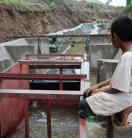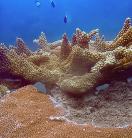Fish ‘ladders’ to build sustainability and livelihoods in Indonesia
A ‘ladder’ that allows fish to traverse rivers despite obstacles such as dams, has helped increase fish stocks in five South-East Asian countries and will now be introduced to Indonesia.
With ACIAR support, the ladders, also known as ‘fish passes’, have helped to improve ecosystems and increased access to fish, a significant source of protein and micronutrients, for people living in the Mekong region by helping fish get to spawning or feeding areas.
‘Restoring damaged aquatic ecosystems, and improving the livelihoods of people dependent on fish, is one of the key objectives of ACIAR fisheries work,’ said Dr Ann Fleming, ACIAR Fisheries Research Program Manager.
‘Fish passes have helped restore fisheries in the Mekong and with that we have also improved the food and nutritional security of people living in those areas.’
The technology is now being adopted in other countries, with ACIAR supporting a new project to establish fish passes in Indonesia, with an additional focus on governance.
Leading the roll-out of the new project in Indonesia and a concluding project in Laos is Professor Lee Baumgartner, Fish Ecologist from Charles Sturt University.
Professor Baumgartner said Indonesia was actively building dams and had plans for massive river infrastructure development over the next 10 years. Fish declines have already been observed in some areas, which has impacted fishing communities. Some species, which were commonly fished, have now disappeared.
‘The exciting part of the four-year opportunity in Indonesia is, by getting in at the start of this really rapid expansion of irrigation modernisation, we can help them think about fish at the early stage and influence some changes.
‘The overall goal is to bring back the fish and see improvements in people’s lives.’
The Indonesia project team will start by developing partnerships between fisheries and irrigation agencies, including policymakers, which was the key to success in the other countries.
They will implement a capacity-building approach with students travelling to Australia for hands-on training once COVID travel restrictions have eased.
The project’s Indonesian partner is the Research Institute for Inland Fisheries and Fisheries Extension, part of the Agency for Marine and Fisheries Research and Human Resources of Indonesia’s Ministry of Marine and Fisheries.
The work in Indonesia follows work in other countries, such as Laos, where local partners tested fish passes. They proved successful with 114 local species using the structures and locals reporting catching fish they had not seen in over a decade.
Over 10 years, they were built and adopted not only in Laos but widely across the Mekong region in Cambodia, Myanmar, Thailand and Vietnam.
ACIAR and its local partners trained local communities to monitor and maintain the fish passes.
In early 2021, the Laos project will see an official ceremony with the Australian Government handing over the first fish pass structure built in the country to local communities.




